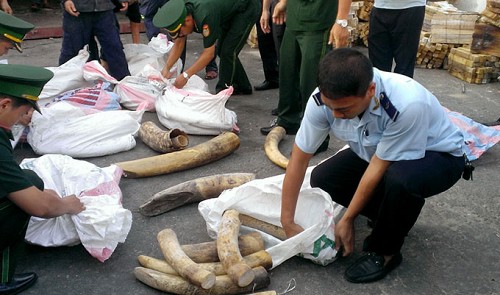Da Nang customs detect tons of wildlife parts stashed in red bean shipment

These sacks of bean, weighing about 19 tons, were packed in a container that was shipped to Tien Sa Port on August 13, the customs said.
Due to heavy rain yesterday, the examination of all the sacks was not fully completed, and the customs force has yet to determine the exact amount of the smuggled wildlife parts.
However, officers estimated that tons of such parts had been stashed among the beans.
The importer of the shipment is Hung Huy Bao Co., Ltd., based in Da Nang.
The Tien Sa port customs said this case was the third incident involving the smuggling of large quantities of wildlife parts that the force has discovered since early this month.
On August 13, port customs officers seized more than 700kg of elephant tusks and rhino horns hidden inside blocks of fake marble shipped to Da Nang from Mozambique.
The consignee of the shipment is Van An Co., Ltd., also based in the city.
On August 21, port customs also detected 2.2 tons of elephant tusks hidden in blocks of timber, slated to be delivered to the same company.
Van An Co. and Hung Huy Bao Co. have business relations, concerned agencies said, adding that they are investigating these cases.
The trade in tusks and rhino horn is banned under the Convention on International Trade in Endangered Species of Wild Fauna and Flora as well as Vietnamese law, as the two items are listed in the World’s Red Book, customs officers said.
Meanwhile, trading in pangolins is banned by the Convention on International Trade in Endangered Species of Wild Fauna and Flora, an international agreement to which Vietnam is a party.
Despite the ban, pangolin populations have suffered from illegal trafficking due to unfounded beliefs in Asia that their scales can stimulate lactation or treat cancer or asthma, according to Dan Challender, an expert on the species at the University of Kent in the UK.
What the stars mean:
★ Poor ★ ★ Promising ★★★ Good ★★★★ Very good ★★★★★ Exceptional
Latest News
More News
- Nestlé Vietnam's Lunar New Year campaign reframes how Tet is counted (January 28, 2026 | 11:40)
- Tet event in Japan celebrates success of 14th National Party Congress (January 25, 2026 | 10:04)
- 14th National Party Congress wraps up with success (January 25, 2026 | 09:49)
- Congratulations from VFF Central Committee's int’l partners to 14th National Party Congress (January 25, 2026 | 09:46)
- List of newly-elected members of 14th Political Bureau announced (January 23, 2026 | 16:27)
- 14th Party Central Committee unanimously elects To Lam as General Secretary (January 23, 2026 | 16:22)
- List of members of 14th Party Central Committee announced (January 23, 2026 | 09:12)
- Highlights of fourth working day of 14th National Party Congress (January 23, 2026 | 09:06)
- Press provides timely, accurate coverage of 14th National Party Congress (January 22, 2026 | 09:49)
- Press release on second working day of 14th National Party Congress (January 22, 2026 | 09:19)
















 Mobile Version
Mobile Version